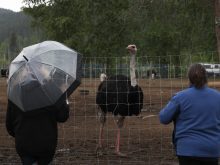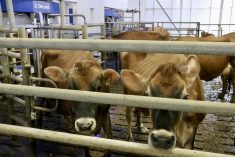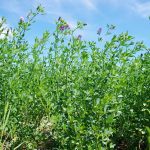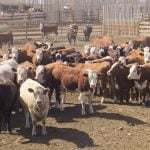Highly pathogenic avian influenza in domestic birds in Canada appears to be in check so far this month in most regions of the country outside southwestern B.C. — but for one recent case in Atlantic Canada.
The Canadian Food Inspection Agency (CFIA) has confirmed an outbreak of high-path avian flu in what it describes as non-commercial, non-poultry birds at a property in eastern New Brunswick.
Details about the property and the type and number of affected birds weren’t available Wednesday, except that the case was detected Jan. 11 in Kent County, north of Moncton.
Read Also

Ample supplies and improved livestock sector to boost Canadian feed sector: FCC
Abundant feed grain supplies and improved profitability for the livestock sector should support strong feed demand and sales through the winter, says a new report from Farm Credit Canada.
New Brunswick has only seen one other case in North America’s current wave of high-path avian flu, detected in a non-commercial poultry flock in Albert County, just south of Moncton, last April. CFIA released the area around those premises from “primary control zone” status on June 7.
In June, the provincial ag department imposed a ban on commingling of domestic birds, such as at fairs, shows, sales or exhibitions.
The department said at the time it would “continue to monitor and re-evaluate the status of the virus (but) it is not expected that we will see a break in virus activity sufficient to allow safe in-person co-mingling of birds for the 2022 season.”
B.C. outbreaks continue
The only other province reporting high-path flu cases so far this month is British Columbia, which since autumn has been Canada’s hot zone for the virus in domestic birds.
As of Jan. 11, about 3.403 million domestic birds in that province have been impacted since the start of the current wave of high-path avian flu in North America in late 2021 — just under half of the Canada-wide total of 6.924 million across nine provinces.
Outbreaks in domestic birds in B.C. since the start of the new year include four commercial poultry operations at Chilliwack, detected Jan. 7, 11, 14 and 18; a commercial poultry operation at Abbotsford, detected Jan. 13; and two backyard poultry flocks on Vancouver Island on Jan. 6, one at Tofino and one in the surrounding Alberni-Clayoquot Regional District.
During December 2022 alone, B.C. saw 35 high-path avian flu outbreaks, all but two of which were in commercial poultry flocks in the Fraser Valley.
The only other provinces seeing outbreaks in December were Ontario, in three commercial poultry operations at Lambton Shores, northeast of Sarnia; and Quebec, in a backyard poultry flock in the Drummond municipality surrounding Drummondville.
While Canada’s wave of cases since late 2021 has been in the H5N1 strain of high-path avian flu, CFIA in November also confirmed a case of H5N6 avian flu in a single wild bird, a blue-winged teal, found in Manitoba.
The bird, which was found alive in August, marks the first-ever confirmed Canadian appearance of H5N6, which has not since been reported again in any wild or domestic birds in Manitoba or elsewhere.
In the U.S., meanwhile, the federal agriculture department’s Animal and Plant Health Inspection Service (APHIS) has reported high-path H5N1 avian flu outbreaks in 47 states since the start of the North American wave, impacting 57.87 million domestic birds across 731 commercial and backyard flocks.
Since the start of the new year, APHIS has reported 13 outbreaks in U.S. domestic flocks, two of which were in commercial poultry: one in northeastern South Dakota, confirmed Jan. 5, and one in northern California, confirmed Jan. 12.
APHIS on Wednesday announced it plans to prepare an environmental impact statement, examining potential effects of its response activities involving high-path avian flu outbreaks in domestic birds. Effects to be examined include potential impacts on soil, air and water quality, public health and plant and wildlife populations. — Glacier FarmMedia Network

















